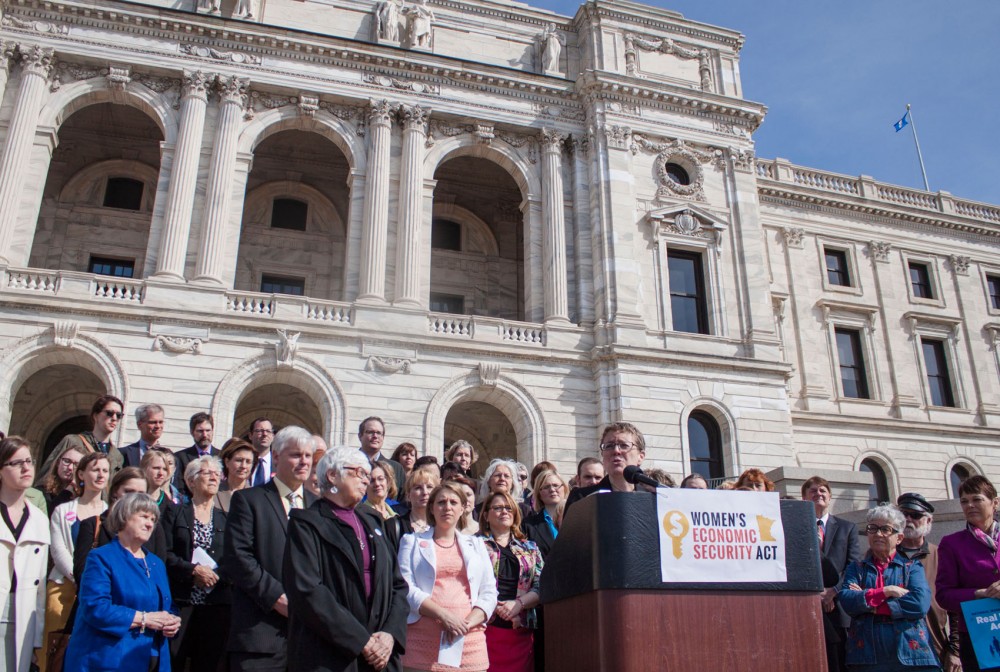At age 16, Danielle Hans asked for a raise so she’d be paid the same as her male co-workers. Her boss denied her request and threatened to fire her.
It was the first time Hans felt the effects of wage discrimination — a less experienced male employee received higher pay for similar work, she said.
On the state Capitol steps Wednesday morning, Hans joined Minnesota legislators and advocates to tout the Women’s Economic Security Act, a measure that focuses on improving working conditions for women.
The proposal, which many say is a long overdue step toward equality for women in Minnesota, passed the House on Wednesday with bipartisan support.
Minnesota women currently make 80 cents to their male counterparts’ dollar, according to a 2014 report from the Humphrey School of Public Affairs Center on Women and Public Policy.
“That’s a house, that’s college education for two kids, that’s food on the table, that’s paying the bills … all of that’s going right back into the economy,” Hans said.
House speaker Paul Thissen, DFL-Minneapolis, approached the Humphrey School and asked University experts to share research supporting the argument.
According to the report, Status of Women and Girls in Minnesota, pay gaps are problematic because women are increasingly becoming primary breadwinners for Minnesota families.
Center director Debra Fitzpatrick, who led the report, testified before legislators on Wednesday, using the research the support her argument.
If gender pay gaps are narrowed, the state’s economy would benefit, she said, because women workers would be earning more and spending that income.
The Women’s Economic Security Act enforces equal pay laws for businesses with state contracts over $500,000 and provides a new grant program that aims to increase the number of women in high-wage, high-demand and nontraditional occupations.
The proposal garnered strong support from House Democrats, but some Republican representatives opposed the legislation, citing negative implications for small businesses.
Opponents argued that some operations would have to change their salary distributions, ultimately affecting their overall bottom line. They noted business owners, who could be women, would feel those negative effects.
Supporters say the argument doesn’t hold much weight.
“While there’s been a lot of focus on costs to businesses, it’s important to also remember that there are important costs to women and their families if we don’t act,” Fitzpatrick said.
The U.S. Senate failed to pass equal pay legislation Wednesday.
Beyond addressing gender pay gaps, the Minnesota act expands benefits for pregnant women and new parents, and it allows those who have experienced stalking or sexual assault to use existing paid sick leave.
Rep. Phyllis Kahn, DFL-Minneapolis, holds the House seat for the University’s district and has a long history of advocating for women’s rights, stemming from her work at the University. She said Wednesday’s floor vote continues her mission of ending gender disparities in Minnesota.
Part of the act includes a bill Kahn authored to expand the minimum amount of unpaid leave for new parents from six to 12 weeks.
For decades, state lawmakers have been generally complacent about passing laws ensuring gender equality in the workplace, said Sen. Sandra Pappas, DFL- St. Paul.
“We assume, incorrectly, that because we passed these laws 50 years ago that we now have equal pay for equal work and women are fully accepted in the workforce,” she said.
It’s unknown exactly when the Minnesota Senate will vote on its version of the act, but it will be in the coming weeks. Gov. Mark Dayton will be required to sign the legislation before it is enacted into Minnesota law.













